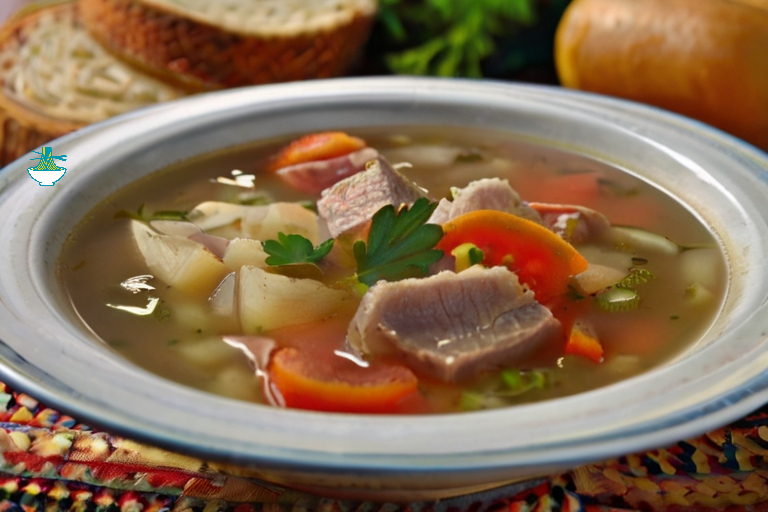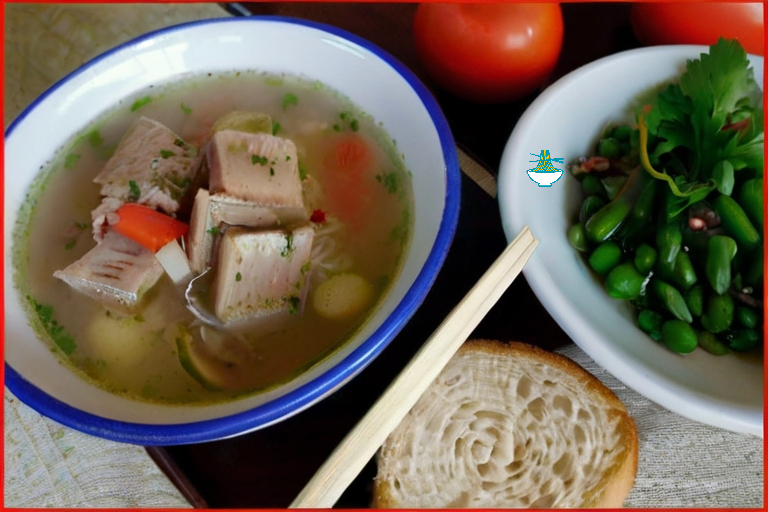Step into the vibrant culinary world of the Caribbean Netherlands with this traditional souse recipe. Souse, a beloved dish across the Caribbean islands, holds a special place in the hearts of locals and visitors alike. Combining tangy flavors with succulent meat, this dish is a celebration of Caribbean culture and culinary mastery.
Originating from the Dutch territories of Bonaire, Sint Eustatius, and Saba, Caribbean Netherlands Souse is a testament to the rich cultural fusion that defines the region. Its roots trace back to African, European, and indigenous influences, resulting in a dish that is both unique and deeply flavorful.
In this recipe, we'll guide you through the process of creating this delightful dish, from selecting the finest ingredients to mastering the art of seasoning and simmering. Whether you're exploring the flavors of the Caribbean or seeking to recreate a taste of home, Caribbean Netherlands Souse promises to delight your taste buds and transport you to the sun-soaked shores of the Dutch Caribbean.
Ingredients:
- 2 pounds of pork belly, skin-on, cut into bite-sized pieces
- 1 cup of vinegar
- 1 onion, thinly sliced
- 4 cloves of garlic, minced
- 2 bay leaves
- 1 teaspoon of whole allspice berries
- 1 teaspoon of black peppercorns
- 1 scotch bonnet pepper, whole (optional, for extra heat)
- Salt, to taste
- Water, as needed
- Fresh bread or cooked rice, for serving

Instructions:
1- Rinse the pork belly pieces under cold water and pat them dry with paper towels. Place them in a large pot.
2- Add the vinegar, sliced onion, minced garlic, bay leaves, allspice berries, black peppercorns, and the scotch bonnet pepper (if using) to the pot with the pork belly.
3- Season generously with salt, then pour enough water into the pot to completely cover the pork belly and other ingredients.
4- Place the pot over medium-high heat and bring the mixture to a boil. Once boiling, reduce the heat to low and let the souse simmer gently, uncovered, for about 1.5 to 2 hours, or until the pork belly is tender and cooked through. Stir occasionally and skim off any foam or impurities that rise to the surface.
5- Taste the souse and adjust the seasoning with additional salt if needed.
6- Once the pork belly is tender, remove the pot from the heat and let it cool slightly.
7- Serve the Caribbean Netherlands souse hot, ladled into bowls alongside fresh bread or cooked rice. Enjoy the flavorful broth and tender pieces of pickled pork belly with your chosen accompaniment.
8- Store any leftovers in an airtight container in the refrigerator for up to 3 days. Reheat gently on the stove before serving.
Nutritional Values:
Here are the approximate nutritional values for the listed ingredients:
Pork Belly (2 pounds):
- Calories: 3000
- Protein: 200g
- Fat: 250g
- Carbohydrates: 0g
- Fiber: 0g
benefits: Rich in protein and essential fats, pork belly provides energy and supports muscle growth and repair.
Vinegar (1 cup):
- Calories: 3
- Protein: 0g
- Fat: 0g
- Carbohydrates: 0.1g
- Fiber: 0g
benefits: Contains acetic acid, which may aid digestion, help control blood sugar levels, and offer antimicrobial properties.
Onion (1 medium):
- Calories: 44
- Protein: 1.2g
- Fat: 0.1g
- Carbohydrates: 10.5g
- Fiber: 1.9g
benefits: High in antioxidants and nutrients such as vitamin C and fiber, onions support immune function, heart health, and digestive health.
Garlic (4 cloves):
- Calories: 18
- Protein: 0.8g
- Fat: 0.1g
- Carbohydrates: 4g
- Fiber: 0.2g
benefits: Known for its antibacterial and antiviral properties, garlic supports immune health and may help lower cholesterol and blood pressure levels.
Bay Leaves (2 leaves):
- Calories: 5
- Protein: 0.2g
- Fat: 0.1g
- Carbohydrates: 1.2g
- Fiber: 0.8g
benefits: Contains antioxidants and essential oils that may have anti-inflammatory and antimicrobial properties, supporting digestive health and immune function.
Allspice Berries (1 teaspoon):
- Calories: 6
- Protein: 0.2g
- Fat: 0.3g
- Carbohydrates: 1.4g
- Fiber: 0.6g
benefits: Rich in antioxidants and anti-inflammatory compounds, allspice berries may help improve digestion, relieve pain, and boost immunity.
Black Peppercorns (1 teaspoon):
- Calories: 6
- Protein: 0.2g
- Fat: 0.3g
- Carbohydrates: 1.3g
- Fiber: 0.5g
benefits: Contains piperine, a compound that may enhance nutrient absorption, support digestion, and have antioxidant properties.
Scotch Bonnet Pepper (1 pepper):
- Calories: 30
- Protein: 1g
- Fat: 0.2g
- Carbohydrates: 7g
- Fiber: 2g
benefits: Packed with vitamins A and C, as well as capsaicin, scotch bonnet peppers may boost metabolism, support heart health, and provide pain relief.
Salt (to taste):
- Nutritional values vary based on the amount used and the type of salt.
benefits: Provides essential minerals such as sodium and chloride, which are important for electrolyte balance, nerve function, and fluid balance in the body.
Water (as needed):
- No significant nutritional value.
benefits: Essential for hydration, regulating body temperature, transporting nutrients, and supporting various physiological functions.
Fresh bread or cooked rice (for serving):
- Nutritional values vary based on the type and quantity of bread or rice used.
benefits: Provide carbohydrates for energy, as well as some vitamins and minerals depending on the type of bread or rice used.
Please note that these values are approximate and can vary based on factors such as the specific ingredients used and cooking methods. Additionally, the values for salt are not included as they can vary greatly depending on personal taste and the amount used during cooking.


Comments